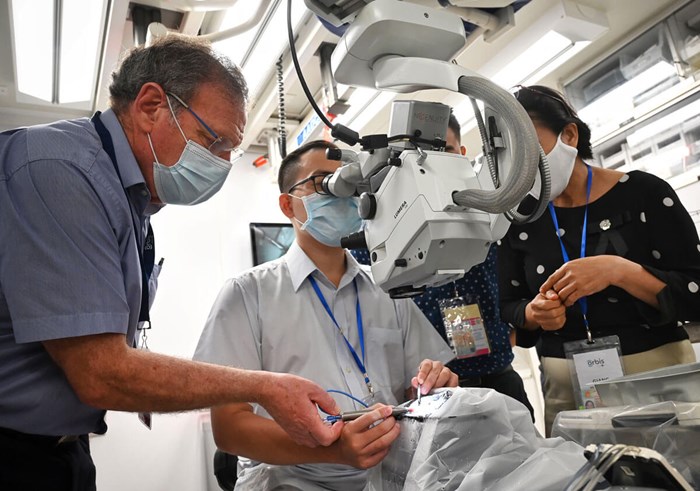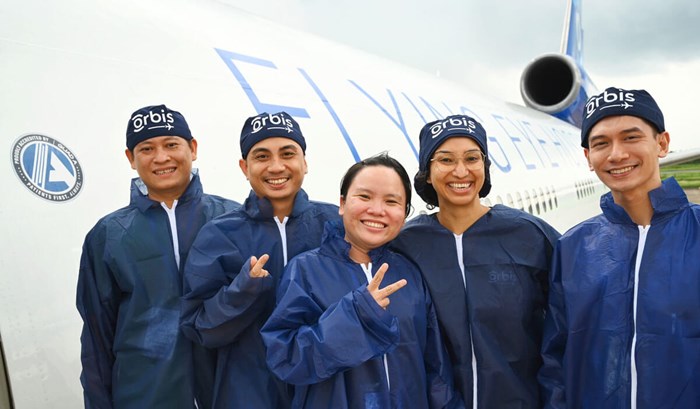Volunteers’ Week (1-7 June) is a chance to celebrate the fantastic contribution volunteers make to communities in the UK and across the globe. This year’s theme is Celebrate and Inspire and aims to highlight that diversity is a strength as there are lots of different ways to volunteer.
For Orbis, expert medical volunteers are instrumental to training programmes for eyecare workers around the world. Over 400 volunteer ophthalmologists, nurses, anaesthetists and biomedical engineers from over 30 countries share their skills with local teams around the world to help improve access to quality eyecare for generations to come, helping to ensure that no one leads a life of avoidable blindness.
Globally, there are 1.1 billion people living with vision loss, yet a staggering 90% is treatable or preventable. With the number of blind people set to triple by 2050, the work of Orbis’ volunteers is as important as ever.

One of the most critical issues in global eye health is the lack of an adequately trained workforce. By talking to partner hospitals and staff, Orbis’ global network of expert volunteers give up their free time to create teaching programmes tailored specifically for their needs. Volunteers conduct this training and pass on the tools to undertake more complicated procedures, improve surgical outcomes and most importantly of all, restore sight to those in need of assistance.
Larry Benjamin, an Orbis medical volunteer and trustee, has been volunteering for Orbis since 2004. In this time, he has given his time to 16 projects, training ophthalmologists in Zambia, China, Myanmar, Pakistan and Ghana, on both the Flying Eye Hospital and independent hospital-based programmes. Larry’s most recent programme was just last month in May 2023 on board the Flying Eye Hospital in Can Tho, Vietnam where he helped to train local teams using a full suite of cutting-edge simulation tools including virtual reality, prosthetic eyes and life-like manikins, enabling eyecare professionals to grow in confidence by practising surgical skills repetitively in a controlled environment, something that can’t be practised on live patients.
Larry said of the trip: “The trainees were able to practise things that are difficult to do on real patients and ask questions as we went along. They all ended up doing things they had never tried before and felt that they had accomplished a lot. Leading simulator training is harder than it sounds as it is important to tailor each session to the individual needs of the surgeons with different experiences. That is one aspect of simulator training that I really enjoy – working out who needs what and then delivering it in a way that enables them all to progress.”

Working with other eye care professionals is something Larry appreciates, as it allows him to experience first-hand the difficulties they face and tailor his teaching to treat preventable eye conditions, such as cataracts: “Watching surgeons develop new techniques is always rewarding. The model eyes I used with the trainees allows most aspects of the surgery to be practised as often as is necessary and I also try to instill in the trainees, no matter how experienced they are, they can carry on with simulator training in their own units by using the model eyes. Whenever they learn a new technique, they should always practise on a model eye first – for the rest of their working lives.”
Thanks to his dedication to volunteering and teaching, Larry has helped to make a difference to eyecare all around the world; “One of the very impressive things with Orbis is their philosophy of teaching local people how to do the surgery rather than just doing it themselves… The principle really is to leave something behind that can grow.”
Larry also recognises the importance of diversity within volunteering: “There is not enough volunteer faculty around the world to cure the problem of preventable blindness and so it has to rely on the ripple effect of teaching other people. It’s not just the doctors, it’s the nurses, the technicians and pilots. There is an awful lot of teaching that goes on all through the programme at all levels.”
To find out more information on volunteering for Orbis, visit their website.



